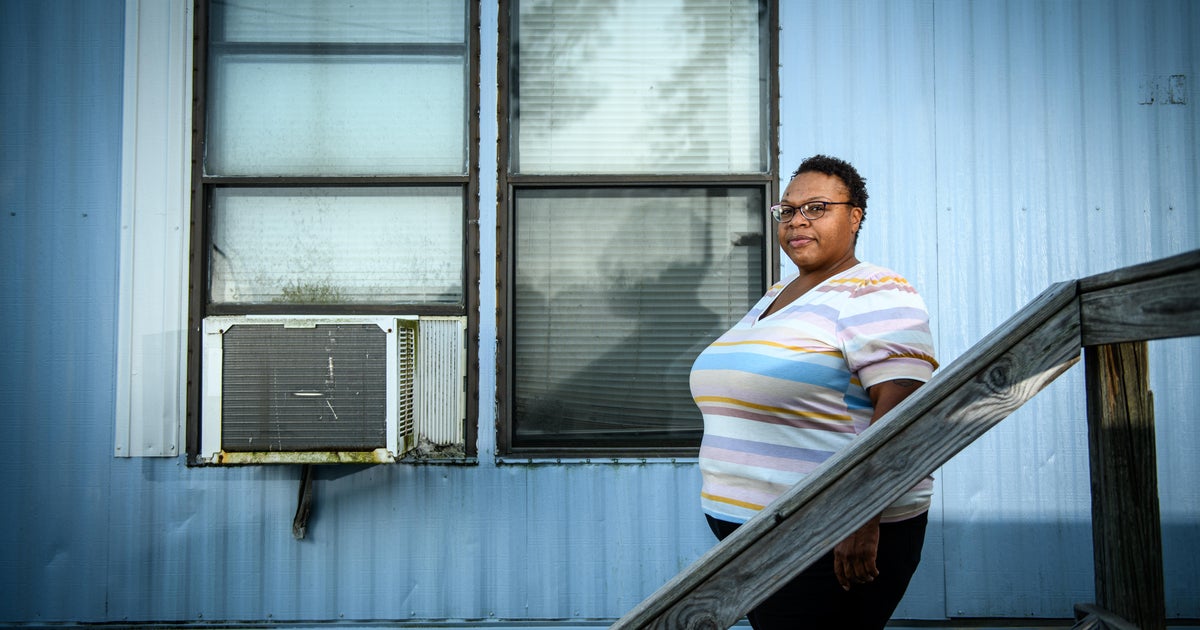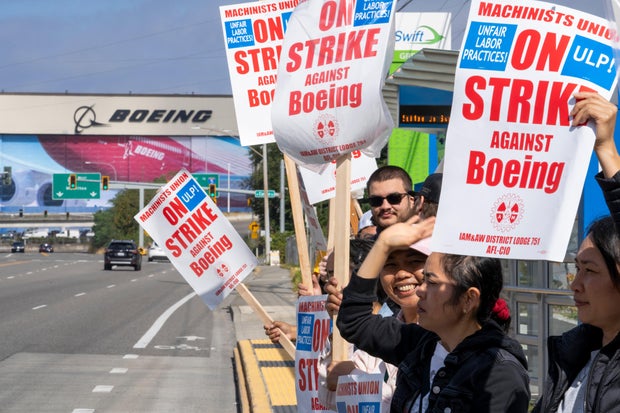CBS News
More Americans are having to choose between food and energy bills

Charlotte, N.C. — During the heat dome that blanketed much of the Southeast in June, Stacey Freeman used window units to cool her poorly insulated mobile home in Fayetteville, North Carolina. Over the winter, the 44-year-old mom relied on space heaters.
In both instances, her energy bills reached hundreds of dollars a month.
“Sometimes I have to choose whether I’m going to pay the light bill,” Freeman said, “or do I pay all the rent or buy food or not let my son do a sport?”
As a regional field organizer for PowerUp NC, Freeman’s job is to help people properly weatherize their homes, particularly in the Sandhills region, where she lives and works and where poverty and rising temperatures make residents vulnerable to the health impacts of climate change.
But Freeman’s income is too high to benefit from the very services she helps others attain from that grassroots sustainability, clean energy, and environmental justice initiative.
Like a growing number of Americans, Freeman struggles with what is known as energy poverty, including the inability to afford utilities to heat or cool a home. Households that spend more than 6% of their income on energy bills are energy-poor, some researchers suggest.
Andrew Craft for KFF Health News
Energy poverty can increase one’s exposure to extreme heat or cold, which raises the risk of developing respiratory issues, heart problems, allergies, kidney disorders, and other health conditions. And the burden falls disproportionately on households in communities of color, which experience it at a rate 60% greater than those in white communities.
Public health and environmental experts say that as climate change continues to create extreme weather conditions, more policy efforts are needed to help vulnerable communities, especially during heat waves.
“Energy poverty is just one example of how climate change can exacerbate existing inequities in our communities,” said Summer Tonizzo, a spokesperson for the North Carolina Department of Health and Human Services.
Extreme heat is the No. 1 cause of weather-related deaths in the U.S., a risk that grows as temperatures rise. Last year, 2,302 people in the U.S. died from heat-related causes, a 44% increase from 2021. In one week in early July this year, extreme heat killed at least 28 people, according to The Washington Post, based on reports from state officials, medical examiners, and local news reports.
Yet, 1 in 7 households spend about 14% of their income on energy, according to RMI, an energy and sustainability think tank. Nationally, 16% of households are in energy poverty, concluded an analysis co-authored by Noah Kittner, an assistant professor of public health at the University of North Carolina-Chapel Hill.
“Old, inefficient buildings and heating systems are prompting people to supplement their energy needs in ways that increase the costs,” Kittner said.
Pregnant women, people with heart or lung conditions, young children, older adults, and people working or exercising outdoors are most at risk for heat-related health concerns. High temperatures are also correlated with mental health issues such as suicide and severe depression.
Location is another risk factor. For example, in a historically Black community in Raleigh, known as Method, temperatures can be 10 to 20 degrees hotter than nearby areas with more vegetation and less development, said La’Meshia Whittington, an environmental justice and clean energy advocate. Interstate 440 runs through Method, and the city stores shuttle buses there, often with engines running.
“That creates a lot of pollution that heats up the neighborhood,” Whittington said. “There’s no land to soak up the heat. Instead, it bounces off shingles, roofs, pavement and creates a stove.”
Method residents frequently complain of chronic headaches and respiratory problems, she said.
While rural areas tend to have lower temperatures than nearby urban areas because they have less asphalt and more trees, they often lack resources, such as health care facilities and cooling centers. Substandard housing and higher rates of poverty contribute to high rates of heat-related illness.
Energy poverty “is the layering of burdens without a means, at the individual level, to combat those burdens,” said Ashley Ward, director of the Heat Policy Innovation Hub at Duke University.
In many parts of the country, extreme heat is a relatively new concern. Policymakers have historically focused on threats from colder temperatures.
The federal government’s Low Income Home Energy Assistance Program, established more than four decades ago, has a funding formula that favors cold-weather states over those that experience extreme heat, according to research from Georgetown University. Florida, Georgia, Arizona, Texas, and Nevada have the lowest proportional allocations of federal funding, while North Dakota, South Dakota, and Nebraska have the highest.
North Carolina has largely relied on private donors and local nonprofits, such as PowerUp, to distribute fans and air conditioning units in the summer, but the state doesn’t contribute to the costs of energy bills.
On extremely hot days, Freeman and her PowerUp NC colleagues work with state health officials to direct vulnerable people to cooling centers.
On a personal level, staying cool this summer meant sending her son to a free, open recreational center, rather than paying for him to join a sports league.
“We’re doing stuff that doesn’t cost,” she said. “Just trying to keep up with the electric bill.”
KFF Health News is a national newsroom that produces in-depth journalism about health issues and is one of the core operating programs at KFF — the independent source for health policy research, polling, and journalism.
CBS News
Boeing set to start large-scale furloughs due to machinists strike

Boeing’s CEO said Wednesday that the company will begin furloughing “a large number” of employees to conserve cash during the strike by union machinists that began last week.
Chief Executive Kelly Ortberg said the people who would be required to take time off without pay starting in coming days include executives, managers and other employees based in the U.S.
“While this is a tough decision that impacts everybody, it is in an effort to preserve our long-term future and help us navigate through this very difficult time,” Ortberg said in a company-wide message to staff.
Boeing didn’t say how many people will face rolling furloughs, but the number is expected to run into the tens of thousands. The aerospace giant had 171,000 employees at the start of the year.
About 33,000 Boeing factory workers in the Pacific Northwest began a strike Friday after rejecting a proposal to raise pay by 25% over four years. They want raises of at least 40%, the return of a traditional pension plan and other improvements in the contract offer they voted down.
Scott Brauer / Bloomberg via Getty Images
The strike is halting production of several airplane models including Boeing’s best-selling plane, the 737 Max. The company gets more than half of the purchase price when new planes are delivered to buyers, so the strike will quickly hurt Boeing’s cash flow.
Ortberg said selected employees will be furloughed for one week every four weeks while retaining their benefits. The CEO and other senior executives will take pay cuts during the duration of the strike, he said, without stating how deep the cuts will be.
All work related to safety, quality, customer support and certification of new planes will continue during the furloughs, he said, including production of 787 Dreamliner jets, which are built by nonunion workers in South Carolina.
Ortberg said in a memo to employees that the company is talking to the International Association of Machinists and Aerospace Workers about a new contract agreement that could be ratified.
“However, with production paused across many key programs in the Pacific Northwest, our business faces substantial challenges and it is important that we take difficult steps to preserve cash and ensure that Boeing is able to successfully recover,” he said.
Boeing’s chief financial officer warned employees earlier this week that temporary layoffs were possible.
The company, which is based in Arlington, Virginia, but has most of its commercial-airplanes business located in the Pacific Northwest, is also cutting spending on suppliers, freezing hiring and eliminating most travel.
Despite two full days of talks assisted by the Federal Mediation and Conciliation Service, the union said Wednesday that no resolution had been reached and no additional negotiations were scheduled, according to CBS Seattle affiliate KIRO-TV.
Striking workers are picketing at several locations in the Seattle area, Oregon and California. The union, which recommended the offer that members later rejected by a 96% vote, is surveying the workers to learn what they want in a new contract. The union’s last strike at Boeing, in 2008, lasted about two months.
If the walkout doesn’t end soon, Boeing’s credit rating could be downgraded to non-investment or junk status, which would make borrowing more expensive. Shortly after the walkout began Friday, Moody’s put Boeing on review for a possible downgrade, and Fitch said a strike longer than two weeks would make a downgrade more likely.
CBS News
A Moment With: Viswa Colluru

Watch CBS News
Be the first to know
Get browser notifications for breaking news, live events, and exclusive reporting.
CBS News
A Moment With: Antonio Berga and Carlos Serrano

Watch CBS News
Be the first to know
Get browser notifications for breaking news, live events, and exclusive reporting.








